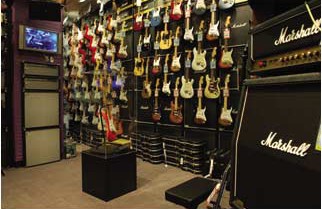Bain Capital debt strikes sour note at Guitar Center
IN THIS ARTICLE
- Banking & Finance Topic
- Stephen Nellis Author
By Stephen Nellis Friday, March 14th, 2014

Westlake Village-based music gear retailer Guitar Center has more than 250 stores around the country. (Guitar Center media/courtesy photo)
With rumors swirling of an ownership change at debt-laden Guitar Center, all eyes will be on whether the Westlake Village-based company reversed its sagging online sales over the critical holiday season.
Guitar Center has about $1.6 billion in debt, with most of that stemming from Bain Capital’s $2.1 billion private-equity buyout of the company in 2007. In late February, the Wall Street Journal reported that Bain was in talks with Ares Management, which reportedly owns a majority of Guitar Center’s debt, to trade Ares’ notes for an equity stake.
Bain, Ares and Guitar Center did not return requests for comment for this story.
Bain’s buyout of Guitar Center happened at the peak of the market in 2007. The company navigated the recession fairly well: In 2009, its revenues were about $2.2 billion; they rebounded after a slight dip, reaching to $2.1 billion in 2012.
But Guitar Center’s debts weigh heavily on its balance sheet. A modest $21 million comes due in 2014 and 2015, with payments ballooning to $150 million and $983 million in 2016 and 2017.
Through it all, the company’s core business of running more than 250 Guitar Center stores has remained operationally profitable. In the third quarter, Guitar Center notched an operating loss of $358 million, which was entirely driven by a goodwill writedown of $360 million. Factoring out the goodwill impairment, the profit was still much smaller than usual, however.
“If you look at the EBITDA, with the exception of the third quarter where it tanked, they look very similar to Dick’s Sporting Goods, which people love. It’s a good model,” said Paul Majeski, publisher of the magazine Music Trades, the biggest source of data on the musical instrument industry. “Musicians do love to go in and shop for gear. It’s not analogous to a Staples, where people are just as happy to get a ream of paper with the click of a button.”
But a great number of musicians do buy gear online, and those sales are a big part of Guitar Center’s business. In addition to its retail stores and Guitar Center website, it owns Musician’s Friend, one of the biggest online retailers of musical equipment. In 2012, the business segment that contains Musician’s Friend was $353.5 million, or about 16.5 percent of sales.
The problem for Guitar Center is its online segment has been steadily sinking, with sales falling nearly 10 percent between 2010 and 2012. Over the same period, the company’s core Guitar Center sales rose 10 percent.
Meanwhile, at competitor Sweetwater Sound, the next-closest major online retailer, sales grew 20.5 percent to $265 million between 2011 and 2012, according to data provided to the Business Times by Music Trades.
On top of that, Amazon.com, a major online instrument seller, was a Guitar Center customer back in 2007, using Guitar Center to fulfill orders. That relationship has ended.
But Majeski traces some of the online troubles to Bain Capital’s decision to consolidate the Musician’s Friend team in Oregon with Guitar Center’s California headquarters.
“Every one of the vendors would just talk about Musician’s Friend in glowing terms,” Majeski said. “[Bain] got rid of the big brain trust up there. That was a devastating blow to the company because they interrupted this great team. Populating a website today and keeping it relevant on the Internet today is a huge undertaking. They broke that.”
Guitar Center is also fighting larger trends in both the economy and the $4.8 billion musical instrument industry. Eric Garland, a future trend analyst, wrote a blog post titled “Guitar Center and the end of big box retail” in November, shortly after Standard & Poor’s cut Guitar Center’s corporate credit rating to CCC+. The post brought on a deluge of traffic to Garland’s site, some of it from angry Guitar Center executives posting comments.
But he stands by his original assessment that enacting the private-equity playbook of “pump it full of debt, show a lot of topline growth, take it back public, charge a bunch of management fees” isn’t sustainable in the age of diminished consumer spending.
“The customers are broke,” Garland said. “There’s nobody left to buy these products. We talk about inequality like it’s a philosophical thing. It’s a practical thing.”
But Majeski of Music Trades said that the role of consumer spending is “overblown” in the musical instrument industry. He said the bigger problem for Guitar Center is online competitors and the used gear market. Old guitars not only remain functional, they tend to increase in value after 20 or 30 years.
As recently as 15 years ago, “when you looked at new product sales, you could say that’s the market,” Majeski said. “Now what do you do? Ebay has over a billion dollars in music products. Amazon and its affiliates are about $400 million a year. You put that together and it’s 25 percent of the business right there. That’s before you get to Craigslist. … On Craigslist alone, if you do a search, the number of items in a city could [fill] one or two music stores.”












